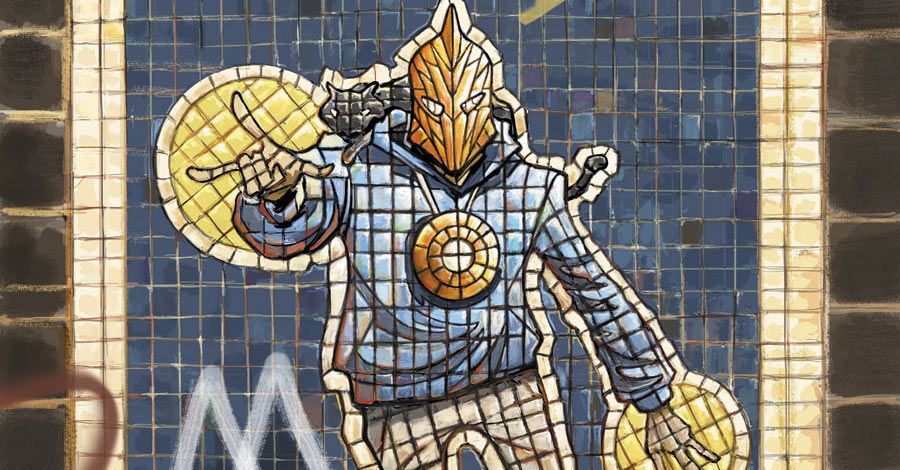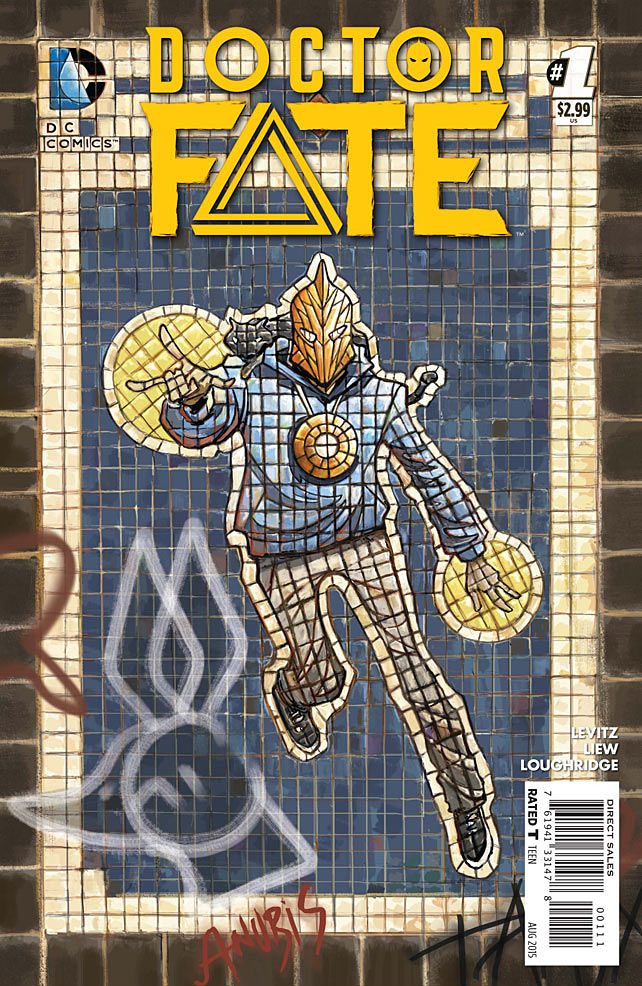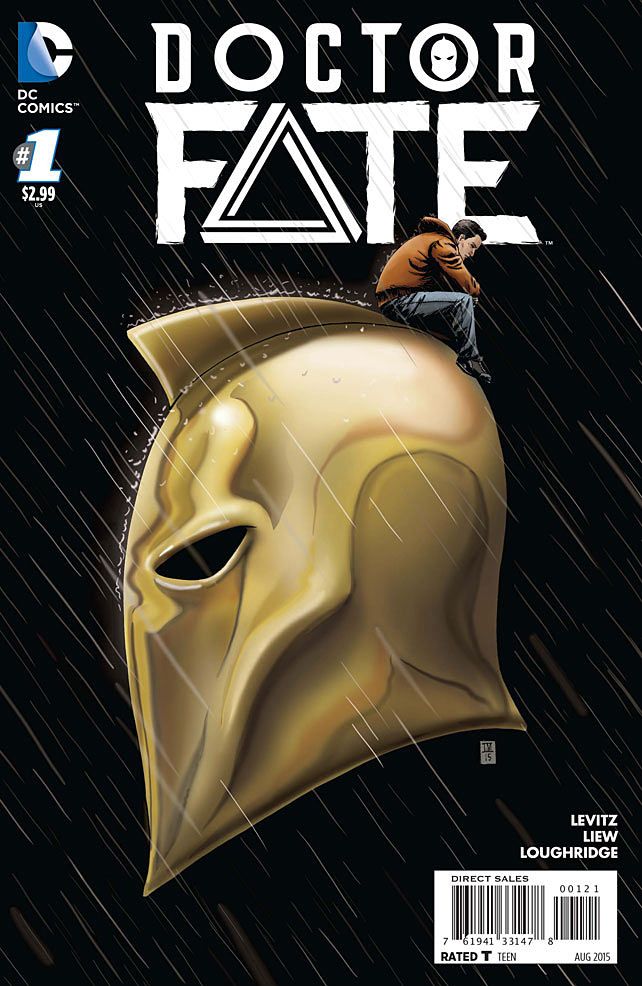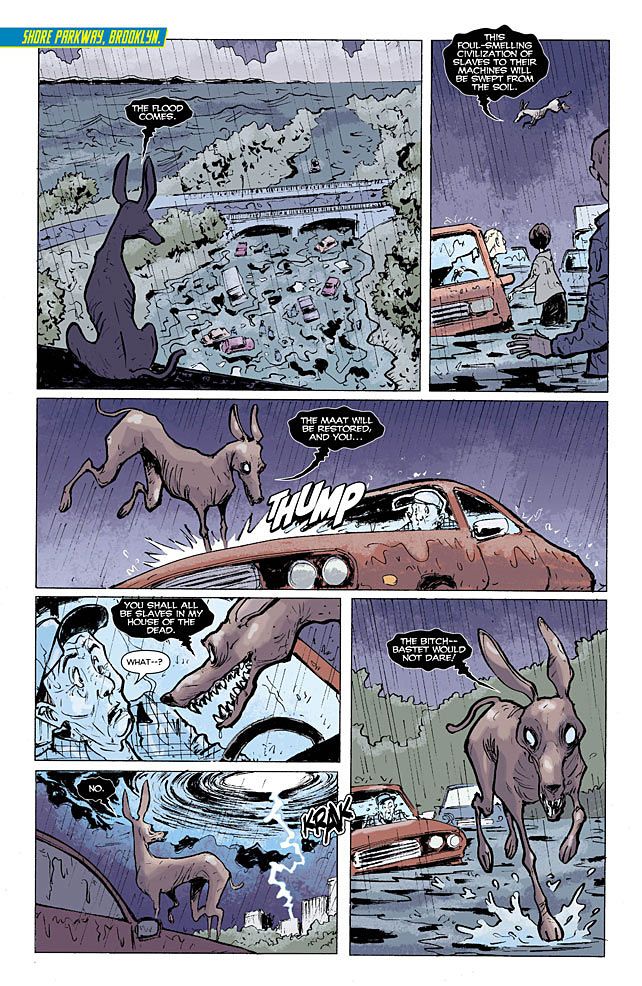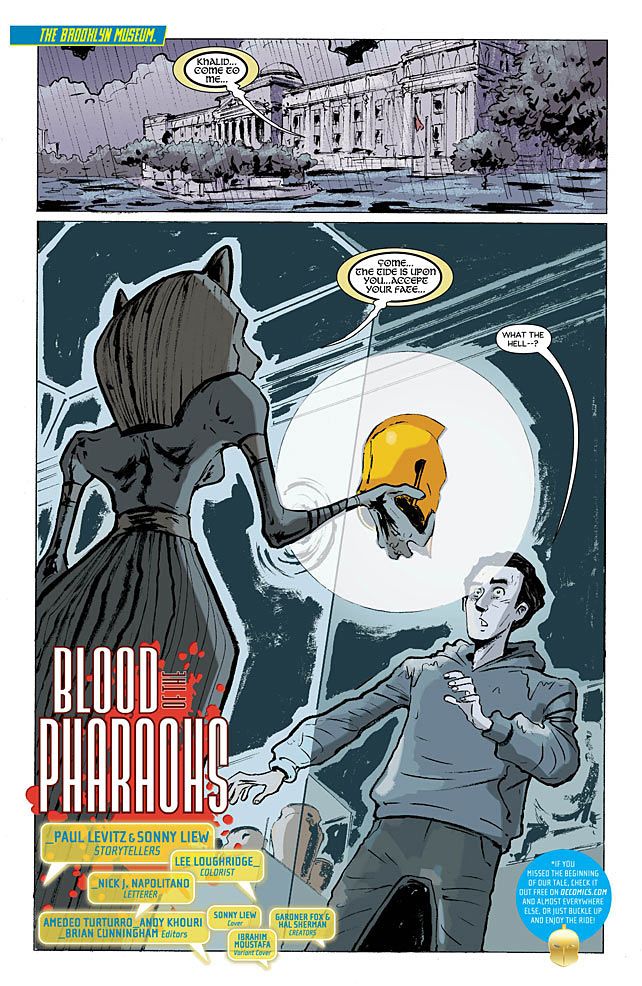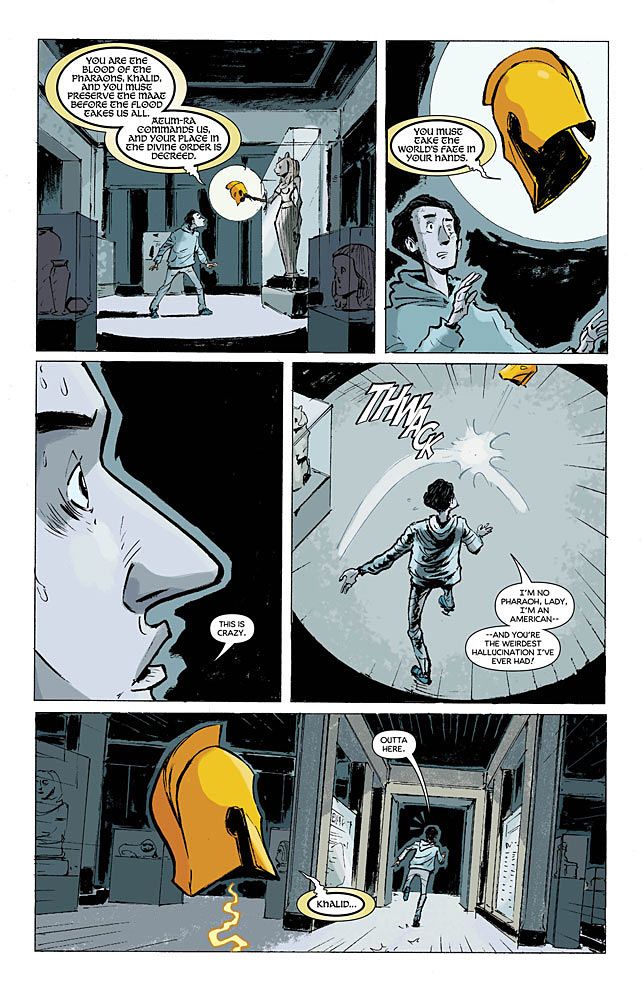Over his decades at DC Comics, Paul Levitz has gone from writer to publisher and back again. And while he's been contributing stories to the DC Universe since the launch of the New 52, he feels a change in the incoming "Doctor Fate."
"I think it's the best thing I've done since I came back to writing," Levtiz told CBR News about the new series launching this Wednesday, June 17, with artist Sonny Liew. The series reenvisions the frequently white, square-jawed Golden Age hero Kent Nelson as Khalid Nassour -- an Egyptian-American medical student torn not only by two cultures but also by the powers of Nabu that are thrust upon him as the gods imperil earth.
DiDio Talks Post-"Convergence" DC: 'We Should Always Be Looking Forward"
The new take on the character, which DC previewed last month via an eight-page Sneak Peek, explores the DCU from a number of new angles, and Levitz explained that "Doctor Fate" is about expanding the kind of story told in the publisher's superhero line. From the character's diverse background to his life as a neophyte healer and from Liew's take on Ditko-esque surreality to a modernized take on the Egyptian gods, this Doctor Fate is looking to reshape the world.
CBR News: Paul, of all the revivals and reinventions going on through DC's June relaunch, "Doctor Fate" holds a pretty unique position in going from secret identity Kent Nelson to Khalid Nassour. What was the thought process behind making this transformation happen?
Paul Levitz: Well, when comics started and when Doctor Fate was created by Gardner [Fox], they couldn't play with very much of the deck. You didn't have ethnicity. You didn't have religion. You didn't have politics. You didn't have sexuality. You had very, very limited human experience to write about in your stories. And some of those guys did really brilliant and wonderful stories despite that. But all that has change in the ensuing decades.
So if you strip what they started with down to the very basics, you have this iconic golden helmet (which is one of the awesome visuals in comics) and a tie to Egyptian mythology (something that goes back to Thoth and other stuff) -- how can I use that and take advantage of all the tools that are available to us for story today that weren't available to Gardner? And Gardner might have used these tools back then, but it was unthinkable in that world. But instead of setting a character in the ethnic world that Gardner was a part of -- and I remember visiting his kids and seeing a family chart that led back to the Daughter of the American Revolution -- I said that if this was a story tied to Egypt, let's make it an Egyptian American kid torn between the two parts of his life.
I've had several cab drivers over the years who have told me long stories of their professional lives in Egypt that they had to abandon in America because they couldn't get recertified. So I made dad an Egyptian doctor who emigrated here and now drives a cab. Mom is an American woman. And their kid has both heritages and draws some challenges from that. Where are Egyptian Americans in New York, the city I know and love best? Well, they're in Bay Ridge, Brooklyn. So we can nest this story in the reality of that. The kid is going to be a doctor since this is Doctor Fate after all, so we put him on the edge of being a doctor in both worlds -- give that element for both sides of his character. He's really this 20-year-old kid who's just about to start medical school the week the story takes place. He's asked by the gods to heal the world -- save the world -- using these powers he has no understanding of and do all these incredible things.
I think you said before that Sonny was your chosen artist for the series, and telling stories about the immigrant experience and identity sagas is the kind of thing he's done before -- most recently in "The Shadow Hero" with Gene Yang. What does having an artist with that background and his cartooning skill set do to complete this character?
I suggested Sonny for it, and I knew him a little bit from back when he did "My Faith In Frankie." We also met a few years ago when I went to Singapore. He's an incredibly smart artist. He's a brilliant writer himself, and he just did this awesome book that has been published in Singapore and will be brought over here by Pantheon next year. It's a masterwork as a cartoonist on every level, and I think it's going to be one of the most interesting books published in America next year.
What he brings to "Doctor Fate" is his interest in identity -- because he's had a complex one himself and lived in a place that has a very complicated sense of identity. He also has a curiosity about things. Every little detail of what we're working on, we go over. He's not been to New York a thousand times, so he looks for lots of stuff online. He'll search through Google Images, and I'll e-mail him more images. I was off wandering Bay Ridge last week for two or three hours just shooting shots that would mimic things I'd written into the story or inspired things I might want to write into it. I have a scene in the fourth issue where Khalid is really searching for answers for the burdens that have been placed on him, and I wrote it with him standing on a street at night in front of both a mosque and a church. I thought there had to be a street like that somewhere in Bay Ridge, and I found this beautiful spot on Fourth Avenue where there's this great, old Christian church, and then four doors down from it was one of these classic storefront mosques. So to be able to give Sonny the real reference on it -- and he may interpret it completely differently in the final pages -- allows us to go back and forth in a conversation.
When you do that with an artist, you're searching for the truth in these materials, and you're searching for the right visual ways to depict everything from the surreality of his journeys. There's a lovely scene coming up in a future issue where Khalid as Fate has a conversation with the Sphinx in ancient Egypt, and he gets a riddle from the Sphinx. Of course, he thinks he knows the answer to the classic riddle of the Sphinx, but that ain't the riddle he's getting this day.
So it's wonderful fun. I'm writing better because I have an artist who's putting his passion into the work and stretching so much -- and because the story has a lot of room to explore things that we haven't had a chance to do before.
In the classic sense of DC mythology and Egyptian mythology, I feel like the Egyptian deities and pyramid imagery and all of that has been the favorite of comic creators for decades. This goes back to the original archeological discoveries from early in the 20th Century catching the public's eye and getting baked into pulp mythology at its inception. But how do you modernize all that interest as you're also modernizing the character of Doctor Fate?
There are some great moments in both the Brooklyn Museum and the Temple of Dendur in the Metropolitan Museum where a lot of those artifacts were taken to New York, but the thing is to make the mythology rich. One author that I love greatly who's been a tremendous influence on my writing is Roger Zelazny. He did a great volume called "Creatures of Light and Darkness" in the 1960s that was a science fiction take on Egyptian mythology where he updated the myths to a future diaspora of multiple worlds and played with them in that setting. I think that may have been the first taste I got of Egyptian mythology. So there's a little bit of influence from there playing on me. I've also gone back and read a lot of mythology to prepare for this.
READ: "DC Sneak Peek: Doctor Fate"
But really this is a take suitable for our time. In the "DC Sneak Peek: Doctor Fate"eight-page story that's already out, you see Anubis as a mix between a feral dog and a jackal somewhere on the streets of New York talking about the fact that "These stupid humans think their world is getting flooded because of the rocks they burn, but I'm doing it. It's time for a fresh flood -- time for the world to flood and start all over again." To be able to play with primal myths like a flood that sinks the world -- which has been a part of Judeo-Christian mythology and Egyptian mythology and so many cultures that many scientists feel it's certainly rooted in something that happened early on -- and recast it as a modern menace gives you a different flavor.
When you go back and look at the original Doctor Fate stories, he basically faced glorified bank robbers or bad magicians. We never really knew what the bad magicians were or what they wanted. The stories were six or eight pages, so there wasn't much to them. But here we have an opportunity to develop the way the gods are playing with humanity -- a sense and scope and scale from that. There's a sense of interdimensionality as I'm trying to work in the influence of my friend Steve Ditko who was one of the great people at giving a sense of cosmic scale whether it was with Dormammu in that mythology he and Stan built in "Doctor Strange." I want to put that sense of scale and scope into the series, which the DC Universe has had from time to time. But the DCU hasn't had a lot of that in recent years, and I don't think it's had anything which resembles Sonny's take on it, which is a very different style than what DC has previously used.
How does Khalid deal with the power of fate? In the past, we've often seen Nabu as a very overbearing presence who speaks directly into the brain of Fate via the helmet.
Nabu is definitely imprisoned within the helmet, and the act of putting the helmet on has a real effect on Khalid aside from just the power that it gives him. But in the early material, Nabu essentially was an instruction manual. He was a combination of a GPS system and the movie version of Iron Man's J.A.R.V.I.S. This helmet doesn't come with an instruction manual. If anything, Nabu is there serving the spirit of Thoth and helping to guide Khalid on certain things -- but he has to ask right. If he can't do that, he wont' get much out of it. So he has a lot of figure out. That's what a lot of issue #4 is about, and the cover for that is a beautiful design showing that instruction manual idea.
But really the question for him is: "How in the hell does this stuff all work? How am I supposed to defeat a god?" Because he hasn't really been given all the powers of a god. He's been given something that a god once wore. It's sort of vaguely inhabited by one of the god's dead servants. It's not a really fair match.
You mention Khalid's father being a doctor himself who now drives a cab, which has to bear down on Khalid in some pretty interesting ways. I know your own son is around the same age as Khalid is in the story. Are there elements of your own life with him working their way into this series?
My youngest is Khalid's age and living out in California. He was the one who was working on "Constantine" while that show was in production, and he's now trying to find his next job -- so anyone with good suggestions for a job for someone who has experience as a writer's room PA, please contact Garret. [Laughs] But I'm certainly leaning on my son occasionally to read this story, and I say, "Is this how your friends would talk?" He's caught me in a few old man-isms because I'm certainly not 22 anymore.
Good stories are about complex sets of relationships. So just in the first few issues, we establish Khalid and his life goals, but we also meet his girlfriend who's also in the med school program with overlapping goals but not identical goals. But then there's his father, who pays a terrible price for Khalid becoming Doctor Fate. And Khalid will have to decide whether he wants to take that terrible price onto himself or whether he's going to leave his father bearing it. There's also Khalid's mother who's American but interested in the Egyptian world and involved in the effects this price will have on her family. And then there's this girl next door who thinks Khalid is pretty cool and shouldn't be spending time with the gal he's with, and she has another agenda for what he should be doing with his life.
I think that's a little different flavor than a lot of what's going on in superhero comics today. I think many of the great superhero comics that I grew up on, whether they were DC or Marvel, had rich supporting casts with very complicated agendas between them that developed over significant periods of time. I don't know if we'll get that length of time with "Doctor Fate," though I'd love to see that happen. But I'm trying to get into that toolbox but with a modern sensibility. What are young people's lives like? What are the conflicts they face now? How do I put all those elements into the material from the mundane of texting to the heights of a quest for spirituality?
Looking at the long term plans for the book, it feels as though DC is supporting these new books with an eye toward giving them some breathing room. How do you then plan on constructing the story of "Doctor Fate" from issue-to-issue?
I envision the first arc should wrap in either issue #6 or 7. I'm in the middle of #5 right now, so it depends on how a couple of elements come together. If I had a great strength in my career, it was longball plotting where I'd build things that came to pass over a long period of time. I don't think I demonstrated that effectively in my work over the last couple of years -- partially because the stories I was working on were caught up in other events of the DC Universe, so they took twists and turns that I wasn't focused on when I started. I'm not saying that's anybody's fault but my own, necessarily. That's just how it worked. The business had changed considerably in the 20 years since I'd been writing full-time.
But I'm hoping that because this takes place in its own little corner of the DCU and because what Dan [DiDio] and Jim [Lee, Co-Publishers of DC Entertainment] have expressed to me is that they want it to have a distinctive flavor of its own, that I'll be able to brew things over time. Will I get to play all those stories out? Well, that depends on whether or not people buy the damn thing. [Laughs] But I've been thrilled by the reaction to the eight-pager that I've seen online. It got very good ratings on the sites that did formal reviews. That doesn't tell me much, but it's all I've got to go by as a first reaction. Now I'm trying to do everything I can to fan the flames.
"Doctor Fate" #1 goes on sale June 17 from DC Comics.

